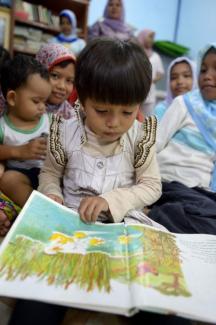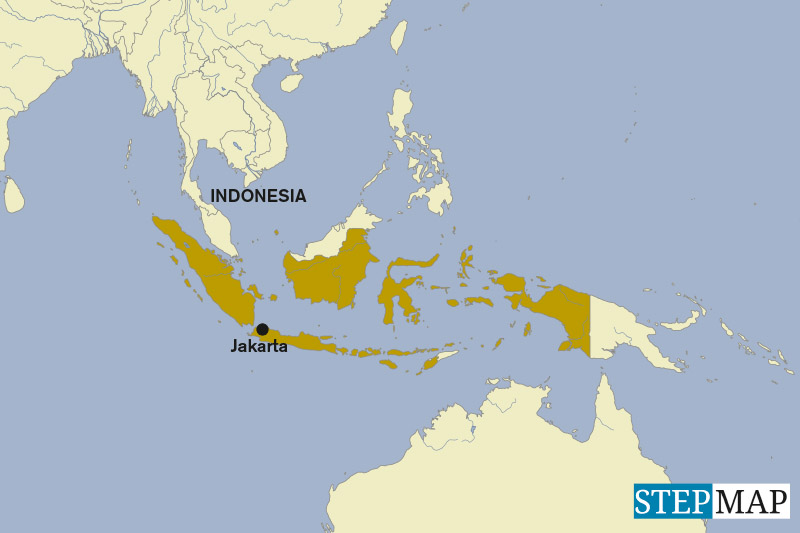Education
Boatloads of books

Books need readers, and even in our digital age, readers still need books. Novels, comics and other printed material are like doors for the mind. They help to expand knowledge, imagination and creativity.
Indonesia’s literacy rate is above 90 %, according to UNESCO and the World Bank. Yet in this country of 250 million people, writers complain that only few people read. They would like more people to have access to books.
In fact, books are expensive and often unavailable. Indonesia has 17,000 islands, and their development has been quite unequal. For people in remote areas, it is much harder to get services, education and information than for those living in the cities. It is no different with books.
Sari Meutia from Mizan Publishing sees distribution as one of the major problems. She says: “Although scholastic material is partially subsidised by the state, the distribution of other reading material, like novels, comics or special interest books is solely dependent on market dynamics.” Bookstores in Indonesia generally sell on a consignment basis. Distribution thus involves costly postal and courier services to get books to their destination – and back, if they are not sold. The costs weigh heavily on publishers.
There are various efforts to rise to this challenge. Ridwan Sururi’s Pustaka Kuda (“horse library”), for example, is making a difference in Central Java. The young man relies on a horse to bring books to children in Java’s rural Purbalingga on Tuesdays, Wednesdays and Thursdays. His own school aged daughter enjoys reading. He loves horses and wanted to reconcile his hobby with serving doing a service for the community. Thanks to his initiative, his daughter and other children in the area have access to books.
This idea came about while talking to Nirwan Arsuka, an essayist and editor, who also has a penchant for horses and was able to send him the books to start the library. Arsuka has similarly supported another rural library in West Sulawesi across the Java Sea.
Hailing from Sulawesi, Arsuka knows the limitations children face there. His heart went out for those living on the surrounding small islands, so he contacted activists and intellectuals, and his idea literally took sail. A traditional cargo boat is used to carry books to the islands, as well as up-river villages on Sulawesi. Junk boats of its kind were traditionally used to ship rice and other commodities. Children are attracted in hordes.
The boat’s captain is Muhammad Ridwan Alimuddin. He used to work as a maritime researcher, but has become a fulltime librarian. He also uses a bike, a horse carriage and a motorbike to bring cases of books to village kids. Small libraries are also mushrooming in other places in Indonesia. The focus is often on children. The libraries are run and supported by people who know that stories and books are a source for dreams and aspirations.
Dark years
The promotion of literacy, creativity and public awareness has a tradition dating back to colonial times in Indonesia, but it ebbed under the Suharto dictatorship that lasted three decades, from the 1960s to the 1990s. In those dark years, books were burned and censored. Being found with printed material that the government did not appreciate could mean imprisonment and torture. Books were burned, street libraries broken up and publishing companies raided.
Since Suharto’s fall, cultural activities have been gaining momentum again. Some projects reach out to street children, some to village children, including “Sokola Rimba” in Sumatra, “Rumah Dunia” in West Java, “Komunitas Kaki Abu” in Papua or “Rimba Baca” in Jakarta. Many individuals privately travel to distant villages to donate books or organise creative workshops.
Film maker Rony Sanjaya is one of them. He belongs to the civil-society group “Ngibing”. The term means dancing, but is an acronym for “frame filling”. He enjoys working with kids and adults: “It is satisfying to see them gain confidence through drawing and creatively developing story lines in comic form”.
Publishers have gotten on the band wagon. Mizan publishing has started a programme that allows children to create their own books, for example. Adibintang and Zikrul publishing run writing classes for children.
The Ministry of Education and Culture recently launched a school literacy programme. It does not only target students, but also trains teachers to promote creativity. The idea is not simply to make people learn how to read and write, but actually encourage them to make use of these skills.
The government programme is still in its infancy. Hopefully, it will lead to a new mindset. To date, many people are still concerned that publications might tackle irritating historical issues (see Edith Koesoemawiria’s comment on how Indonesia is dealing with the traumas of the Suharto era) or that they might include indecent sexual dimensions. On the other hand, many young and old people alike realise that books matter. The more one reads, the better one becomes able to decide for oneself.
Edith Koesoemawiria is a freelance journalist.
hidayati@gmx.de












